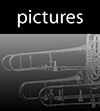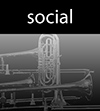BSO Musicians and their "offending instruments" at the British Airways terminal waiting to board the flight home.
As the Boston Symphony returned Sunday from a very successful concert tour of Europe, we entered a very difficult situation with British Airways. Although we had been traveling with the airlines throughout the continent without any incident, it seems the carrier felt it necessary to change their carry-on policy just before the last leg of our travel at our London, Heathrow connection. Things became very heated at the gate as the agent insisted that even though we dutifully reported at pre-boarding, there was no room on the Boeing 747 overhead for our instruments. The situation got so bad that at one point I asked if I may simply purchase a different way home by flying with another airline but I was informed that since I was with a group (the BSO) the entire ensemble would need to de-plane and go with me. Hence my twitter post during the discussion - a discussion that actually delayed the plane approximately 45 minutes. I made my stand with a several BSO musicians and after a time we and the gate agent, and the gate agent's supervisor, and the gate agent's supervisor's manager and the Jetway Chief actually came to an understanding and I was able to bring my trombone aboard. The concession was that I needed to check my camera backpack to make them happy.
The camera backpack had fit fine beneath the seat in front of me for my travel thus far but BA seemed EXTREMELY concerned about my legroom for some reason so I simply removed my Nikon D800 and precious lenses and carried them in my lap for the flight. There were a few musicians not as argumentative as myself, one of them actually crying, when I boarded the plane because they were all forced to check their precious instruments. I contemplated the entire flight, "What could I or any other musician have done if I had been traveling alone?"
Flying can be really stressful. Even without a musical instrument it is not hard to find many examples of travelers being consistently marginalized, steamrolled, and even abused, by the airline industry. We all learn this quickly enough. As travelers, we simply strap on a "steel cup" and grit our teeth through the ordeal of flying for the true joy of experiencing distant lands and people.
Don't get me wrong, I have enormous respect for the professionals of the airline industry. I cannot imagine the long hours, the technical, organizational, and even the people skills necessary to make each flight happen safely on time. For the most part, whether rules and regulations make sense to me, I'm easy to please as long as we get where we go in one piece.
The truth is, I adore traveling. I think it is one of the fundamental things a person should do as part of a life well lived. But many people's fear of flying stems from the anxiety inducing fact that boarding a plane is a conscious choice to enter a situation where you have no control. From when you can pee to a vomiting seat mate, once that aircraft cabin door closes, there's nothing you can do but endure whatever the airline chooses for you.
I have been a musician all of my life and I can tell you honestly that most people who care about me or know my career have little comprehension of the terror of flying with a musical instrument. They understand that my trombone is special. They know it is valuable. "Is it insured?" Yes. But let me tell you something that every traveling musician understands. The instrument I own is NOT replaceable. Even if it was destroyed by careless baggage handlers because I was forced to check it when there was plenty of space in the overhead bin and the gate agent might have been on a egotistical power trip, there is over a 1 year wait to have my trombone replaced by insurance with an even remotely similar instrument.
Most people don't understand the instrument I clutch tightly is my livelihood. With it, I am the sole source of income for my family. Because of my trombone, my family can eat regularly with a roof over their heads. They are kept warm in the winter and even have medicine when they need it. My children will one day go to college because of this irreplaceable custom instrument.
If it is so important, you might ask, why not buy an extra seat when you fly?
Although very expensive, this is what many members of the cello community do to travel with larger instruments that are literally 10-100 times more expensive than my trombone and infinitely more irreplaceable. A cello bow alone (not even the actual cello) is often worth more than $100,000.00 and the cello itself is completely irreplaceable - often over 200 years old from a celebrated maker who is long dead. Unfortunately the tactic of buying an extra seat is unreliable and there are scores of articles that outline the abusive methods that airlines and particularly British Airways employs to "get more meat in the seats". The simple fact is that since instruments are not people, most airlines view the additional seat as expendable space that they can utilize for an extra person on an oversold flight and insist the instrument be checked, regardless of the money musicians put down to insure their instruments safe travel. This article from The Guardian about international cello soloist Steven Isserlis outlines the horrors of bullying and threatening by British Airways and shows quite clearly how an extra ticket for precious instruments is not a fool proof solution.
They were asking to gate check your trombone in a hard case, how bad could it be?
Matthew Visconti's destroyed bell......
Here is a picture of my less argumentative student, Matthew Visconti, who relented to a gate agents request for him to check his trombone. The damage to his horn is catastrophic and it will need to be replaced.
What about a special flight case manufactured against rigors of careless baggage handlers?
I actually do have a flight case that is manufactured to be checked but this strategy has a fundamental flaw. It seems that checked baggage security officers cannot resist opening my flight case to examine what is inside. The simple fact is that whenever a non trombonist tries to hold my trombone, they always damage it - no matter how "careful" they try to be. To baggage check my trombone is actually to assume that a non musician is going to take it out and inspect it. Without fail my checked trombone always comes out at the claim damaged from that process.
There is the matter of carelessness on the general baggage handlers part. I don't know if it is the sheer number of bags they must process moving at high speed or just careless contempt, even in a flight case, checked instruments often come through the vinyl curtain of the baggage carousel at least roughed up. I've had checked trombone cases come out on the carousel with astonishing damage where the only explanation is that the handlers must have run over my trombone. The video included is of a poor cello player who checked his instrument in a flight case and arrived at his destination only to find his precious instrument in pieces. Sad and baffled, he bought a cheap student cello and tried to recreate whatever carelessness cause such destruction. At 2 minutes, 49 seconds into the video he places the cheaper cello in the flight case and drops it 8 feet. We then see him open the flight case and take the undamaged cheap cello out of the case where he demonstrates by playing it that it is fine. The question is, if an 8 ft drop is not enough to damage the cello inside a flight case manufactured to be baggage checked, what is really going on with our checked instruments?
Apart from all the rules I may or may not understand that are necessary for safe travel, what is absurd about my British Airways experience is the mid travel policy change and the fact since there was actually an extraordinary amount of overhead space once I boarded the plane, that it was policy change without reason. I was always taught that it is dirty pool to change the rules in the middle of the game so I will call British Airways out on the fact that they felt it necessary to implement a dramatic policy change on a connecting flight. If my carry on baggage was fine when I checked in at Berlin, Tegel then it should be the same at London, Heathrow. The other absurdity is the fact that once I boarded the plane as the last passenger in row 50 with my trombone, there was an embarrassing about of room in the overhead compartment. The amount of extra space WITH my trombone stowed was like putting a hot dog in a walk in closet and I was left wondering, "Why wouldn't the gate agent simply let me try to find space at the beginning of the discussion? If it didn't fit we could talk about other options, right?" I was literally the 3rd person in line to board the plane so there would have been plenty of time to arrange for something else and get the plane off the ground in time.
“‘‘(1) SMALL INSTRUMENTS AS CARRY-ON BAGGAGE.—An air carrier providing air transportation shall permit a passenger to carry a violin, guitar, or other musical instrument in the aircraft cabin, without charging the passenger a fee in addition to any standard fee that carrier may require for comparable carryon baggage, if— ‘‘(A) the instrument can be stowed safely in a suitable baggage compartment in the aircraft cabin or under a passenger seat, in accordance with the requirements for carriage of carry-on baggage or cargo established by the Administrator; and ‘‘(B) there is space for such stowage at the time the passenger boards the aircraft. ‘‘(2) LARGER INSTRUMENTS AS CARRY-ON BAGGAGE.—An air carrier providing air transportation shall permit a passenger to carry a musical instrument that is too large to meet the requirements of paragraph (1) in the aircraft cabin, without charging the passenger a fee in addition to the cost of the additional ticket described in subparagraph (E), if— ‘‘(A) the instrument is contained in a case or covered so as to avoid injury to other passengers; ‘‘(B) the weight of the instrument, including the case or covering, does not exceed 165 pounds or the applicable weight restrictions for the aircraft; ‘‘(C) the instrument can be stowed in accordance with the requirements for carriage of carry-on baggage or cargo established by the Administrator; ‘‘(D) neither the instrument nor the case contains any object not otherwise permitted to be carried in an aircraft cabin because of a law or regulation of the United States; and ‘‘(E) the passenger wishing to carry the instrument in the aircraft cabin has purchased an additional seat to accommodate the instrument.” ”
Further research on this very issue garnered a document from the US Congress which outlines the strategy above as exactly what I should have requested at the beginning. Every musician should travel with page 75 and 76 of this document.
FAA Modernization and Reform Act of 2012
But since the words, "US Government" and "FAA" may not have had the weight that I hoped for in the United Kingdom flying British Airways, I'm not sure I would have gotten the results that I wanted if I had that page in hand, but my overall point is that the totalitarian dictatorship of airline companies, although I suppose somewhat necessary for safe travel, in this case was abused by British Airways. My experience is not isolated, nor is it as bad as it could have been. Cursory research of their blatant bullying of musicians and documentation of their misdeeds is very VERY easy to find.
MUSICIANS BEWARE, travel safe, and know your limits because it seems every solution to travel with your instrument; to bring it on the plane as a carry on, to buy an extra seat, or to check it in a flight case, is a gamble. If it is a gamble to destroy your livelihood, it actually may be better to stay home, take a later flight, or in dire situations of tiny planes, I've even checked my case and carried my trombone in pieces wrapped in a coat. If there is no other way but to baggage check it, DO NOT SIGN A WAIVER AND DO NOT WAIT UNTIL YOU GET HOME TO MAKE SURE YOUR HORN IS OKAY! Once you leave the airport the Airline is absolved of any damage to your instrument.
Despite their saccharine platitudes, airlines often care very little about us or our precious instruments when traveling. Let's face it, they are in charge and are doing all they can to protect their bottom line. The airline industry has generated deniability at every level so there's little reason to care about your horn and there is little to no culpability if your instrument is damaged or destroyed. Do your research. Some airlines have a bad reputation amongst musicians and it's best to avoid them if possible when traveling. I think it is safe to say I will be avoiding British Air and their partners from now on - perhaps you should too.










